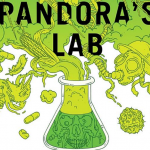nerve gas
What, with all the attacks on science and scientist these days, we may not want to be focusing on those times when science goes off the rails and makes a huge mess of things. But, science at its best and scientists at their best, will never shy away from such things.
Dr. Paul Offit just wrote a book called Pandora's Lab: Seven Stories of Science Gone Wrong, which not about an evil black dog that escaped from a box, but rather, seven instances when the march of scientific progress headed off a cliff rather than in the desired direction. People died. Many people died. Other bad things…
Why Hitler is Different
Hitler is not entirely different from Pol Pot, Stalin, and the other mass killers. He is not entirely different from other fascists. But there is a short list of people, with Hitler on that list, who have this characteristic: They were so bad that we can not and should not compare their badness to each other outside of certain limited academic contexts, and they were so bad that any comparison made between them and their works to anyone not on that list, or to their works, threatens to devalue their badness.
We can not devalue the evil of Hitler or his kind.…
Two recent papers to come out of the Weizmann Institute have possible medical applications -- one in preventing pregnancy, the other in preventing the deadly effects of nerve gas.
The first might give pause to those among us who are "believers" in antioxidants. It seems that those "nasty" molecules they eliminate -- reactive oxygen species -- have a positive role to play, at least when it comes to fertility. In the study, mopping up reactive oxygen species with antioxidants in mouse ovaries blocked ovulation. So while women who are trying to get pregnant might consider knocking off the acai…
Mark Pendergrast writes: To kick off this book club discussion of Inside the Outbreaks, I thought I would explain briefly how I came to write the book and then suggest some possible topics for discussion.
The origin of the book goes back to an email I got in 2004 from my old high school and college friend, Andy Vernon, who wrote that I should consider writing the history of the EIS. I emailed back to say that I was honored, but what was the EIS? I had never heard of it. I knew Andy worked on tuberculosis at the CDC, but I didn't know that he had been a state-based EIS officer from 1978…

